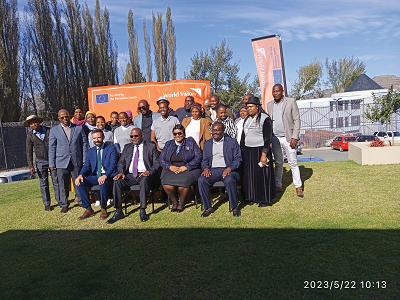By Limpho Rantletse
Maseru –
World Vision International Lesotho hosted a high level roundtable discussion on Humanitarian Advocacy and Disaster risk deduction and management at Lancers in Maseru. The roundtable event was intended to create a platform for all relevant stakeholders to participate in an interactive dialogues with the community representatives.
The key advocacy for discussion included the government to fast track the promulgation of the disaster Risk Deduction and Management Bill of 2020 in to law with thorough public consultations done and review to ensure that the most vulnerable receive the help they need the most. World vision Lesotho representatives advocate for enactment of laws, protection of children and social inclusion.
The World Vision Lesotho child representatives’ talked about the practical challenges that the children face before the eco project. The first young advocate speaker said Article 33 of the united nation conversion on the rights of a child 1988 says ‘government should protect children from sexual abuse’ but there is quite the opposite in our country. The country is experiencing high rates of sexual exploitation and abuse in Mokhotlong Polihali leading to high numbers of child marriages. There are also high rates of child labor especially in Ha Suoane, a village in Thaba-tseka where boys are forced into labor as head boys instead of going to school. Education Act 2010 states “free quality and compulsory education in Lesotho, section 6, 5 indicates that a parent who does not take the kid to school is found eligible for punishment and is guilty of an offence but we do not see that happening in our country.
It was also argued that schools do not capacitate people living with disabilities for disaster preparedness and infrastructure does not cater for them. The children representative plead to the state holders to pay attention to the children of Lesotho, for the betterment of children’s life, and protection of their basic human rights.
The other young advocate. Setenteng Nthako acknowledged the incredible work done by the eco project in ensuring the wellbeing and development of children with regard to disaster and sexual exploitation. The first achievement by eco project is children are well capacitated on weather forecast, risk reduction and prevention of sexual exploitation. Children in areas that are likely to be affected by disasters such as snow are now able to read the weather forecast and prepare for disasters. The eco project has also developed the school response plans. It was said that before the implementation of this project young people from areas likely to experience disaster lack knowledge of such disasters.
The young advocates also plead with the government to take in to account the apposition materials and equipment of disaster replacements in schools, improvement of food security in schools, enforcement of children’ protection and welfare act of 2011. It should be maintained that whoever marries the child is guilty and shall be charged and executed.
The European Union Representative Mario said the EU is fully committed to support Lesotho. The EU launched the three new cooperate programmes which will support renewable energy, social protection and inclusive governance in Lesotho. In this program the EU want to support Lesotho development energy production from water, sun and wind while reviling excess to a full Noble Energy of Lesotho. The EU will also present job creation and financial opportunities. Lesotho currently spends around 630 million a year on electricity imports. The EU sources are committed to reduce the impact of soil erosion through the faction program ReNOKA. ReNOKA aims to improve soil and water conservation through concrete action implementation.
Among other things that were discussed at this event, were advocacy messages from councils in different districts such as Mokhotlong, Thaba-tseka and Leribe. Districts representatives plead the government to take into account the school infrastructure in rural area schools such as Mojekisane primary in Mokhotlong where pupils have to grab a brick in order for them to have a sit. There are no roofing materials and as such pupils are forced to not go to school at times of disaster such are heavy rain. Road infrastructure also needs to be implemented in the mentioned districts. Mokhotlong people also beg the government to take into account the current South African Eskom load shedding that is affecting them.
People were later taught about how world vision international works. The World vision Lesotho uses two approaches on advocacy which are citizen empowerment and CVA Model. The CVA model is a social accountability and local level advocacy model which help the community to have access to information. The CVA also creates a platform where communities can be heard. This model has three phases; enabling citizen engagement, initial meetings and interphase meeting, improvement of services which is the last phase. It was concluded by encouraging the community to come together to advocate their messages and support each other.


